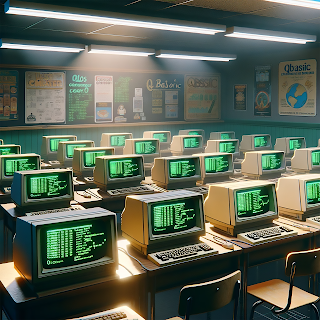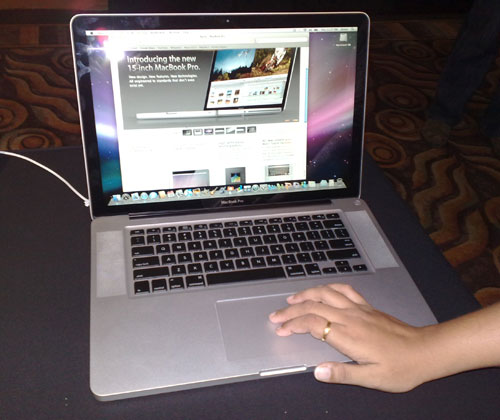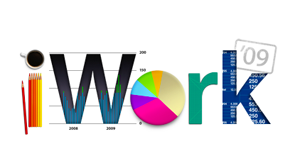In this blog post, I discuss how literacy is evolving—a concept that has fascinated humanity since the advent of long-distance communication technologies such as the telegraph and telephone. Nowadays, our interaction with information is marked by its agility and rapidity, as demonstrated by AI advancements like ChatGPT from OpenAI.
 |
| Print magazines line a newsstand at the airport. |
The way we access tools online is altering how we access texts. When Google search was first developed in the late '90s, the shift was from looking up information in print media to finding information online. However, we did not know it then, but search was a static, linear form of reading, not much different from how we generally read – in clusters of words and phrases, placed one after the other. Now, computer programmers have built tools designed to make savvy deductions on matters ranging from "The Best Way to Write a Cover Letter" to "Romanticism in Britain in the late 19th century." Instead of 'finding' what we need, we are 'sourcing' it. It's incredible, really. These generative AI models, including others like Google’s Bard (now, Gemini) and Bing’s Copilot, are built on extensive datasets, which range from Shakespeare's works to modern product labels. However, the opacity surrounding these datasets raises critical questions about transparency and intellectual property.
Consider the hypothetical 'Books three' corpus, comprising 157,000 copyrighted books. The file is purportedly an illegal 'scrape' of proprietary content The use of such a comprehensive dataset in AI training could potentially revolutionize our access to literature. This aligns with my vision of immediate access to any book, a dream that once felt unattainable.
The transformation in literacy is stark when we look back historically. In the past, literature was an auditory experience, where figures like St. Ambrose and Augustine engaged with texts through oral recitation. In this iteration of reading, words were vocal, heard, and disruptive. So, when Augustine saw his teacher Ambrose reading silently one day, it was a surprise to the young priest. That Ambrose could read to himself, without whispering the words, was a revelation. Recalling my time as Brother Bede, when I was a Benedictine monk, I remember being taught that in St. Benedict's 'Rule,' he emphasized the importance of reading out loud, contrasting with our present view of reading as a solitary, silent activity. And I realized that I spend most of my time reading silently, but when I do read out loud, it is a different, qualitative experience. I can feel the difference and can imagine being like Augustine, feeling his surprise when he saw Ambrose read silently – it blew his mind. Another shift in literacy is on its way, and it is just as, or more, mind-blowing than silent reading.
Certainly, it is mandatory to mention that the Gutenberg printing press was a pivotal moment in literacy, enabling widespread distribution of books, thus changing the way information was disseminated. In 2024, the proliferation of printed and digital materials further morphs our interaction with texts like 'Don Quixote', 'Arabian Nights', and contemporary literature. When books were first made affordable to a growing middle class, the modern-day educational system also developed, and while the ability to read and write was a luxury afforded only to the upper classes, the clergy, and those at the top echelon of the governing state, they found themselves not the only folk who benefited from literacy and reading. I cannot imagine myself not being able to read. An older man in my building was asking me about the gas bill, wondering if it had risen for me. I showed him my bill, and he meekly told me, "Oh, that's okay. I believe you." He was Mandarin-speaking, and I knew he knew a little English, but when I showed him a translation explaining that the building was reinstalling some pipes, he immediately told me, "I don't read that type of Chinese." I realized that I had known him for a long time and it was true, I had never seen him read, and he never liked to receive written messages, always preferring one-on-one conversations. I had a moment of realization that he lived in a more limited world than someone who was literate, but he seemed okay, thriving really. He maintained his backyard with pear trees and figs, and in the summer, massive tomatoes grew on a vine along the back red brick of the house. And I definitely do not know how to grow a garden the way he does; it is a loving exercise and I admire it. An eighty-year-old man doing the work, and I feel this strange sense of embarrassment, like I realize I am not as educated as he is, even though I can read fairly well, and if I want to, I can also read in a couple of other languages. My entire life revolves around words and literacy. It is my bread and butter. But still, there is something about the immediacy of the oral word, the spoken, that feels legitimate to me.
Our age is marked by AI-assisted and multimedia reading experiences. I just received a response today from one of my students – a short written response on the theme of curiosity as it develops in a passage from Ovid. But I had him talk about it one-on-one, and the eloquence that was in the written words was lost. And as I listened to him speak, I realized that he had indeed read the text; that was not the problem; he had not understood it. He would have to sit with Ovid a bit more. But is that something we still do? Long, sustained, silent reading, like Ambrose in his study? Even listening to audiobooks – which I actually think of as the purest way to experience literature, the way Homer would have spoken the words of the Odyssey – is popular, and maybe that is a way back to an older iteration of speaking and listening. In a recent poll conducted by the Pew Research Center, 23 percent of Americans say they haven't read a book in whole or in part in the last year. The people who are not reading, according to the data, are high school graduates without a college degree. The poll data showed that "Hispanic adults, older adults, those living in households earning less than $30,000, and those who have a high school diploma or did not graduate from high school were among the most likely to report in that survey they had never been to a public library." But of those who read, literacy is more important than ever – and how we access information is critical for how we see ourselves in the future. Are we going to continue to be a society that still attends to words in the way that a professor of antiquity will learn Latin or Greek in order to read texts written in languages no one speaks or writes in anymore? We no longer solely read a book from start to finish. We consume content in various forms: watching videos, listening to podcasts, or even immersing ourselves in a VR device that places us within a 3D rendering of a play's setting. This multi-modal approach to literacy allows for a more dynamic and interactive engagement with text, challenging the traditional linear narrative.
This revolution in literacy is reshaping educational paradigms. Teachers will navigate a landscape where students have instant access to a vast array of texts and AI tools. Lessons will no longer be confined to structured units but will evolve into expansive, interactive explorations of literature and information.
The shift to this tech-integrated literacy might lead to a disconnection from our sense of humanity, necessitating escapes to technology-free zones for mental health. Resorts in remote locations, offering a respite from digital saturation, would become essential for re-grounding our human experience.
In summary, the way we relate to language and literacy is undergoing a profound transformation. We are moving from traditional, linear reading habits to fragmented, AI-integrated, and multi-modal literacy. This shift challenges us to rethink our approach to reading and its implications for our cognitive and social development.





















